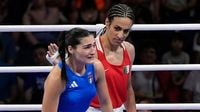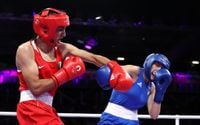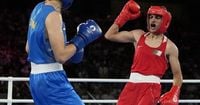World Boxing, the international authority for Olympic-style amateur boxing, sent shockwaves through the sporting world on August 20, 2025, with the announcement of a sweeping new policy: all athletes competing in the women’s category at its events must now undergo mandatory sex testing. The policy, which will debut at the 2025 World Boxing Championships in Liverpool from September 4 to 14, is the organization’s most decisive move yet to address the heated debate over gender eligibility and competitive fairness in women’s boxing.
The decision comes in the wake of a yearlong controversy that erupted after the 2024 Paris Olympics, where Imane Khelif of Algeria and Lin Yu-ting of Taiwan clinched gold medals in the women’s divisions despite previously failing gender eligibility tests. The uproar over their victories—neither athlete identifies as transgender—sparked a global conversation about the integrity of women’s sports and the adequacy of current eligibility standards. Activists, politicians, and even President Donald Trump weighed in, with many calling for stricter regulations to ensure a level playing field.
World Boxing’s new policy is clear and uncompromising. All athletes over the age of 18 hoping to compete in the women’s category must submit to a one-time PCR (polymerase chain reaction) or equivalent genetic screening test to confirm their biological sex at birth. The key criterion is chromosomal: competitors must have XX chromosomes or lack any Y chromosome genetic material—specifically, the SRY gene—to be eligible for the women’s division. Those with Y chromosome material or evidence of male androgenization due to a difference of sexual development (DSD) will be required to compete in the men’s category. National federations bear the responsibility for conducting and certifying these tests.
Failure to provide valid certification, or the submission of false documentation, will result in ineligibility for the athlete and could trigger sanctions against both the competitor and their national federation. The policy also establishes a process for review and appeal: athletes with adverse results may have their cases examined by World Boxing’s expert medical panel, with further evaluation—including genetic, hormonal, and anatomical assessments—available for complex DSD cases.
“World Boxing respects the dignity of all individuals and is keen to ensure it is as inclusive as possible, yet in a combat sport like boxing, we have a duty of care to deliver safety and competitive fairness, which are the key principles that have guided the development and creation of this policy,” World Boxing President Boris van der Vorst stated. “It has been a long and detailed process, but it was vital that we examined all of the medical, legal and sporting issues raised by this issue and I am confident that in introducing testing to certify the eligibility of an athlete to compete as a male or female, the new policy on ‘Sex Age and Weight’ will deliver sporting integrity and protect the safety of all participants.”
The policy was developed over nearly a year by World Boxing’s Medical and Anti-Doping Committee Working Group, reflecting both the complexity and urgency of the issue. Van der Vorst emphasized that the new rules prioritize the women’s category due to the heightened concerns about safety and fairness in female competition. “We recognize that the issues relating to eligibility in boxing are more pronounced in the women’s events, which is why we have made the decision to implement the policy in the female category first,” he explained. Testing for the men’s division is scheduled to begin on January 1, 2026.
World Boxing communicated the coming changes to all member national federations well ahead of time. In May 2025, the Algerian Boxing Federation received a letter stating that Imane Khelif would need to pass a sex test to compete in the June Eindhoven Box Cup. Khelif ultimately did not attend the tournament. She has consistently maintained her eligibility, telling CNN, “For me, I see myself as a girl just like any other girl. I was born a girl, raised as a girl, and have lived my entire life as one.”
The new rules have drawn strong reactions across the boxing community and beyond. Many activists who opposed Khelif’s Olympic gold have celebrated the policy as a long-overdue correction. Social media buzzed with commentary: “One year after the biggest women’s sports scandal in Olympic history, the new federation vows safe, fair fights for women,” one user on X posted. Another wrote, “This seems a sensible policy at first reading—and it appears ALL competitors must take the test, not just those wishing to go into the women’s division.” Still, some have raised concerns about privacy and the potential for stigmatization, especially for athletes with DSD or naturally high testosterone levels.
The debate is not limited to boxing. World Athletics, the governing body for track and field, recently reintroduced chromosome testing for women’s events, with a September 1 deadline for athletes to submit to gene tests ahead of their world championships. Chromosome testing was once common in Olympic sports but was largely abandoned in the 1990s due to scientific ambiguities and ethical concerns. Many sports organizations shifted to hormone testing, but this too has proven controversial, especially for women with naturally elevated testosterone.
World Boxing’s approach is notably strict. Athletes with DSD characterized by male androgenization will be eligible only for the men’s category. However, the organization has pledged to offer extensive additional analysis and an appeals process for athletes with complex cases, aiming to balance fairness with compassion. National federations are tasked with conducting the tests and submitting results, ensuring compliance at every level of the sport.
The policy’s timing is also strategic. World Boxing, launched in April 2023 after a split from the embattled International Boxing Association, received provisional recognition from the International Olympic Committee in February 2025. As the body responsible for Olympic qualification in boxing for the 2028 Los Angeles Games, its decisions now carry even greater weight. President Donald Trump, addressing the issue at an August 5 press conference, declared, “There will be a very, very strong form of testing” for the 2028 Olympics, signaling support for the stricter direction.
For many, the upcoming World Boxing Championships in Liverpool will serve as the first major test of the new regime. Will the policy ensure a fairer, safer competition for women? Or will it spark further debate and controversy? With the eyes of the sporting world watching, World Boxing’s bold move is set to reshape the landscape of amateur boxing—and perhaps the broader world of women’s sports—for years to come.
As boxers and federations scramble to comply with the new rules ahead of Liverpool, the stakes couldn’t be higher. The outcome of this policy—both in its implementation and its impact on athletes—will likely reverberate far beyond the ring.



